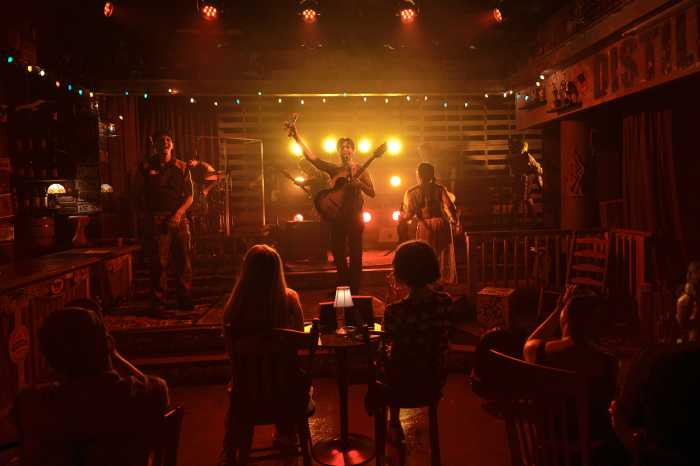Max Rhyser and Kohler McKenzie in Dan Fingerman’s “The Austerity of Hope,” directed by Dan Dinero. | BEN STROTHMANN
“The Austerity of Hope,” a vibrant drama about a group of gay friends set against the hubbub of the Obama campaign –– a big hit at last year’s Fresh Fruit Festival –– is having an encore staging just in time for peak election season.
But you won’t find Romney or Big Bird or Binders Full of Women. Because this is the 2008 presidential race, when the nation was caught up in McCain, Palin, and Obama’s impassioned pledges of Hope and Change.
And while the dated subject may seem about as appealing as a week-old cupcake from Magnolia Bakery, director Dan Dinero manages to make Dan Fingerman’s insightful script feel as fresh and relevant as ever.
From the get-go, we are immersed in the stuff that made that election so legendary, via a frenetic audio montage of iconic sound bites like “Yes We Can,” “lipstick on a pig,” and “I can see Russia from my house.”
This unique era, rife with Obama promises of taming the mortgage crisis and battles over Proposition 8, is a compelling backdrop for Fingerman’s main agenda, exploring the erratic dynamics of gay relationships.
This band of friends in their late 20s, who live in Astoria, Queens (pointedly not the more glamorous Chelsea or Williamsburg), is coping with so many vicissitudes that “The Austerity of Hope” feels like a soap opera — a sort of queer hybrid of “The Young and The Restless” and “Sex and the City.” As the title suggests, hope is in short supply, despite what audacious Obama says.
Impressively, Fingerman has tossed all kinds of meaty issues — gay and otherwise — into this simmering stew.
Mike (Micah Spayer) and Jonathan (Derrick Ledbetter) are long-term live-in partners who begin to clash over career paths, open relationships, and gay marriage. Simon (Max Rhyser) is a shameless sex fiend who cruelly treats his one-night hookups like, well, one-night hookups, and has a bros-with-benefits thing going with Kurt (Kohler McKenzie), a married dude in denial.
The steadfast romantic Braydon (Jacob Perkins) finally meets the man of his dreams, Scott (Lee Garrett), who may be a closeted TV star. Claire (Anni Weisband) is a selfless, sensitive “fag hag” (she loathes that label, by the way) who contemplates moving to Korea to find herself.
Act I ends in a good old-fashioned cliffhanger. Will Mike and Jonathan call it quits? Will Simon say goodbye to Kurt forever? Will Braydon be able to commit to Scott? Does Claire have the guts to leave New York? And most importantly, will Obama’s election win really change a damn thing?
Act II finds this crew one year later, and the answers are surprising.
“The Austerity of Hope” boasts some terrific elements. Dinero employs overlapped scenes to maximum effect. The uproarious scene of the gang meeting at a local bar to watch the election results is smartly juxtaposed with Simon and Kurt going at it on a living room couch. The pace is enlivened with a soundtrack of bouncy period tunes by the likes of Mika, Lady Gaga, and Madonna.
There are glitches. Some transitions are sluggish, and certain exchanges don’t ring true. The stage, cluttered with a pile of mismatched furniture, can barely accommodate the cast. And I think it’s time to ban jokes about gay couples shopping at Bed Bath & Beyond.
What’s more, the play’s climax is marred by melodramatic resolutions and a hackneyed plot device. It turns out that Mike, an aspiring author, wrote an article for New York magazine about his friends during this period, in longhand on a yellow pad of paper, no less. The title? “The Austerity of Hope,” naturally.
The 12-person, diverse cast is appealing if somewhat uneven, with Weisband and Garrett delivering nuanced, grounded performances that go against stereotypes.
The most impressive by far is Rhyser, whose brash, opinionated Simon is devilishly alluring. The hairy-chested actor cuts quite a figure as the unshowered stud, sprawled languidly on a trick’s couch wearing only black briefs, chatting on his cell phone with Claire, and fibbing about his sexcapade. Simon arguably undergoes the most abrupt metamorphosis of the bunch, and Rhyser makes it wholly believable.
By play’s end, characters come to realize that perhaps they should not look to a president to cure their inertia, but rather search deep within themselves.
THE AUSTERITY OF HOPE | June Havoc Theatre | Abingdon Theatre Arts Complex | 312 W. 36th St. | Oct. 26-27; Nov. 1-3 at 8 p.m.; Oct. 29-30 at 7 p.m.; Oct. 27-28; Nov. 3 at 2 p.m. | $18 | smarttix.com


































